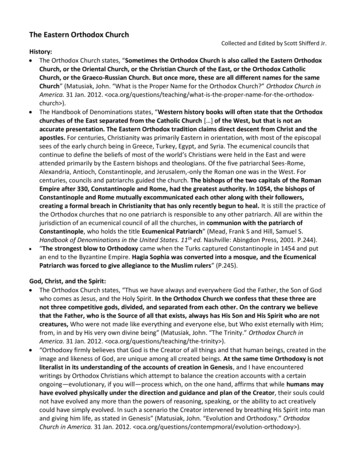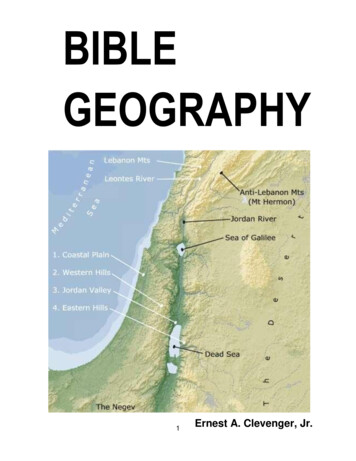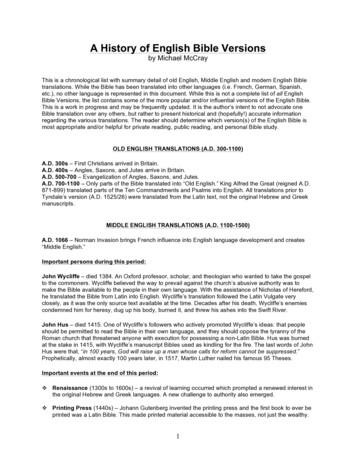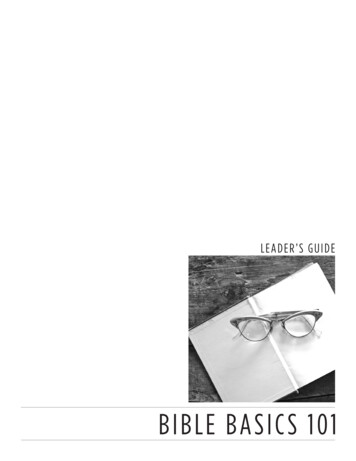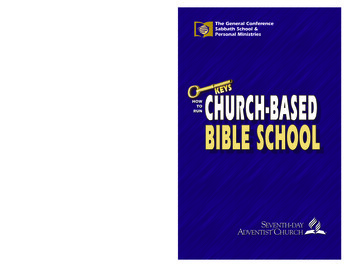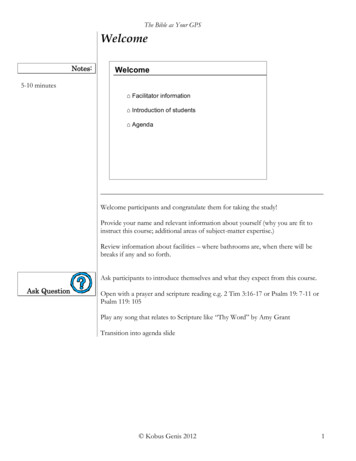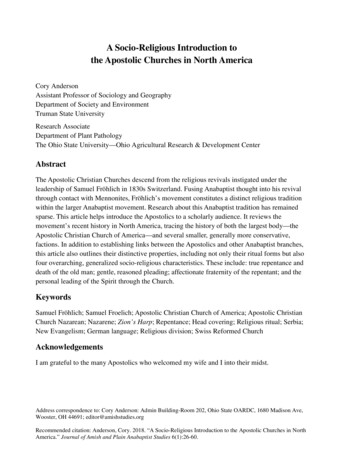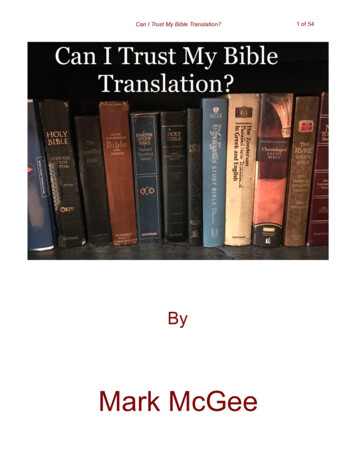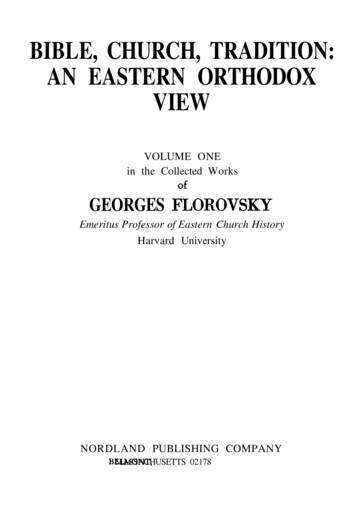
Transcription
BIBLE, CHURCH, TRADITION:AN EASTERN ORTHODOXVIEWVOLUME ONEin the Collected WorksofGEORGES FLOROVSKYEmeritus Professor of Eastern Church HistoryHarvard UniversityNORDLAND PUBLISHING COMPANYBELMONT, MASSACHUSETTS 02178
MAJOR WORKS BY GEORGES FLOROVSKYThe Eastern Fathers of the Fourth Century (in Russian)The Byzantine Fathers from the fifth to the Eighth Century (in Russian)The Ways of Russian Theology (in Russian)Library of Congress Catalog Card Number 72-89502ISBN 0-913124-02-8 Copyright 1972 by NORDLAND PUBLISHING COMPANYAll Rights ReservedPRINTED IN THE UNITED STATES OF AMERICA
About the AuthorBorn in Odessa in 1893, Father Georges Florovsky wasAssistant Professor at the University of Odessa in 1919.Having left Russia, Fr. Florovsky taught philosophy inPrague from 1922 until 1926. He was then invited to thechair of Patrology at St. Sergius' Orthodox TheologicalInstitute in Paris.In 1948 Fr. Florovsky came to the United States. Hewas Professor and Dean of St. Vladimir's TheologicalSchool until 1955, while also teaching as Adjunct Professor at Columbia University and Union Theological Seminary.From 1956 until 1964 Fr. Florovsky held the chair ofEastern Church History at Harvard University. Since 1964he has taught Slavic studies and history at Princeton University.Fr. Georges Florovsky, Emeritus Professor of EasternChurch History at Harvard University and recipient ofnumerous honorary degrees, is a member of the AmericanAcademy of Arts and Sciences.About the Collected Works of Fr. FlorovskyThe Collected Works of Fr. Georges Florovsky will be published inEnglish and will contain his articles in Slavic studies as well as in ChurchHistory and Theology which have previously appeared in Russian, German,French, Bulgarian, Czech, Serbian, Swedish and English. Each volume willbe arranged thematically. Included in the Collected Works will be his twomajor works on the Church Fathers (The Eastern Fathers of the fourthCentury and The Byzantine Fathers from the Fifth to the Eighth Century).
Table of ContentsChapter IThe Lost Scriptural Mind9The Modern Mind and the Bible — Preach the Creeds — The TraditionLives — What Chalcedon Meant — Tragedy in a New Light — A NewNestorianism — A New Monophysitism — The Modern Crisis — TheRelevance of the FathersChapter ΠRevelation and Interpretation17Message and Witness — History and SystemChapter IIIThe Catholicity of the Chuch37The Theanthropic Union and the Church — The Inner Quality ofCatholicity — The Transfiguration of Personality — The Sacred andthe Historical — The Inadequacy of the Vincentian Canon — Freedomand AuthorityChapter IVThe Church: Her Nature and Task57The Catholic Mind — The New Reality — The New Creation —Historical AntinomiesChapter VThe Function of Tradition in the Ancient Church73St. Vincent of Lérins and Tradition — The Hermeneutical Questionin the Ancient Church — St. Irenaeus and the "Canon of Truth" —The Régula Fidei — St. Athanasius and the "Scope of Faith" — ThePurpose of Exegesis and the "Rule of Worship" — St. Basil and"Unwritten Tradition" — The Church as Interpreter of Scripture — St.Augustine and Catholic AuthorityChapter VIThe Authority of the Ancient CouncilsAnd the Tradition of the Fathers93The Councils in the Early Church — The Imperial or Ecumenical
Council — Christ: The Criterion of Truth — The Meaning of theAppeal to the FathersChapter VUSt. Gregory Palamas and the Tradition of the Fathers .105Following the Fathers — The Mind of the Fathers — The ExistentialCharacter of Patristic Theology — The Meaning of the "Age" of theFathers — The Legacy of Byzantine Theology — St. Gregory Palamasand TbeosisNotes121
CHAPTER IThe Lost Scriptural Mind"As the Truth is in Jesus" (Ephesians 4:21)are not supposed to preach theirprivate opinions, at least from the pulpit. Ministers arecommissioned and ordained in the church precisely to preachthe Word of God. They are given some fixed terms ofreference—namely, the gospel of Jesus Christ—and they arecommitted to this sole and perennial message. They areexpected to propagate and to sustain "the faith which wasonce delivered unto the saints." Of course, the Word of Godmust be preached "efficiently." That is, it should always beso presented as to carry conviction and command the allegiance of every new generation and every particular group.It may be restated in new categories, if the circumstancesrequire. But, above all, the identity of the message must bepreserved.One has to be sure that one is preaching the same gospelthat was delivered and that one is not introducing insteadany "strange gospel" of his own. The Word of God cannotbe easily adjusted or accommodated to the fleeting customsand attitudes of any particular age, including our own time.Unfortunately, we are often inclined to measure the Word/CHRISTIAN MINISTERS"The Lost Scriptural Mind" originally appeared in the December 19, 1951issue of The Christian Century as "As the Truth is in Jesus." Copyright byThe Christian Century Foundation and reprinted with permission.
10Bible, Church, Tradition: An Eastern Orthodox Viewof God by our own stature, instead of checking our mindby the stature of Christ. The "modern mind" also standsunder the judgment of the Word of God.Modern Man and ScriptureBut it is precisely at this point that our major difficultybegins. Most of us have lost the integrity of the scripturalmind, even if some bits of biblical phraseology are retained.The modern man often complains that the truth of Godis offered to him in an "archaic idiom"—i.e., in the languageof the Bible—which is no more his own and cannot be usedspontaneously. It has recently been suggested that we shouldradically "demythologize" Scripture, meaning to replace theantiquated categories of the Holy Writ by something moremodern. Yet the question cannot be evaded: Is the languageof Scripture really nothing else than an accidental and external wrapping out of which some "eternal idea" is to beextricated and disentangled, or is it rather a perennial vehicleof the divine message, which was once delivered for alltime ?We are in danger of losing the uniqueness of the Wordof God in the process of continuous "reinterpretation." Buthow can we interpret at all if we have forgotten the originallanguage? Would it not be safer to bend our thought tothe mental habits of the biblical language and to relearnthe idiom of the Bible ? No man can receive the gospel unlesshe repents—"changes his mind." For in the language of thegospel "repentance" (metanoeite) does not mean merelyacknowledgment of and contrition for sins, but precisely a"change of mind"—a profound change of man's mental andemotional attitude, an integral renewal of man's self, whichbegins in his self-renunciation and is accomplished and sealedby the Spirit.We are living now in an age of intellectual chaos anddisintegration. Possibly modern man has not yet made uphis mind, and the variety of opinions is beyond any hopeof reconciliation. Probably the only luminous signpost wehave to guide us through the mental fog of our desperate
The Lost Scriptural Mind11age is just the "faith which was once delivered unto thesaints," obsolete or archaic as the idiom of the early churchmay seem to be, judged by our fleeting standards.Preach the Creeds!What, then, are we going to preach? What would Ipreach to my contemporaries "in a time such as this"? Tljfereis no room for hesitation: I am going to preach Jesus, andhim crucified and risen. I am going to preach and to содаmend to all whom I may be called to address the message ofsalvation, as it has been handed down to me by an uninterrupted tradition of the Church Universal. I would not isolatemyself in my own age. In other words, I am going to preachthe "doctrines of the creed."I am fully aware that creeds are a stumbling block formany in our own generation. "The creeds are venerablesymbols, like the tattered flags upon the walls of nationalchurches; but for the present warfare of the church in Asia,in Africa, in Europe and America the creeds, when they areunderstood, are about as serviceable as a battle-ax or anarquebus in the hands of a modern soldier." This was writtensome years ago by a prominent British scholar who is adevout minister too. Possibly he would not write them today.But there are still many who would wholeheartedly makethis vigorous statement their own. Let us remember, however,that the early creeds were deliberately scriptural, and it isprecisely their scriptural phraseology that makes them difficult for the modern man.Thus we face the same problem again: What can weoffer instead of Holy Scripture ? I would prefer the languageof the Tradition, not because of a lazy and credulous "conservatism" or a blind "obedience" to some external "authorities," but simply because I cannot find any betterphraseology. I am prepared to expose myself to the inevitablecharge of being "antiquarian" and "fundamentalist." And Iwould protest that such a charge is gratuitous and wrong. Ido keep and hold the "doctrines of the creed," conscientiouslyand wholeheartedly, because I apprehend by faith their
12Bible, Church, Tradition: An Eastern Orthodox Viewperennial adequacy and relevance to all ages and to allsituations, including "a time such as this." And I believe itis precisely the "doctrines of the creed" that can enable adesperate generation like ours to regain Christian courageand vision.The Tradition Lives"The church is neither a museum of dead deposits nora society of research." The deposits are alive-depositumjuvenescens, to use the phrase of St. Irenaeus. The creed isnot a relic of the past, but rather the "sword of the Spirit."The reconversion of the world to Christianity is what wehave to preach in our day. This is the only way out of thatimpasse into which the world has been driven by the failureof Christians to be truly Christian. Obviously, Christiandoctrine does not answer directly any practical question inthe field of politics or economics. Neither does the gospelof Christ. Yet its impact on the whole course of human historyhas been enormous. The recognition of human dignity, mercyand justice roots in the gospel. The new world can be builtonly by a new man.What Chalcedon Meant"And was made man." What is the ultimate connotationof this creedal statement? Or, in other words, who was Jesus,the Christ and the Lord ? What does it mean, in the languageof the Council of Chalcedon, that the same Jesus was "perfectman" and "perfect God," yet a single and unique personality?"Modern man" is usually very critical of that definition ofChalcedon. It fails to convey any meaning to him. The "imagery" of the creed is for him nothing more than a pieceof poetry, if anything at all. The whole approach, I think,is wrong. The "definition" of Chalcedon is not a metaphysical statement, and was never meant to be treated as such.Nor was the mystery of the Incarnation just a "metaphysicalmiracle." The formula of Chalcedon was a statement offaith, and therefore cannot be understood when taken out
The Lost Scriptural Mind13of the total experience of the church. In fact, it is an "existential statement."Chalcedon's formula is, as it were, an intellectual contour of the mystery which is apprehended by faith. OurRedeemer is not a man, but God himself. Here lies theexistential emphasis of the statement. Our Redeemer is onewho "came down" and who, by "being made man," identifiedhimself with men in the fellowship of a truly human lifeand nature. Not only the initiative was divine, but the Captainof Salvation was a divine Person. The fullness of the humannature of Christ means simply the adequacy and truth of thisredeeming identification. God enters human history andbecomes a historical person.This sounds paradoxical. Indeed there is a mystery: "Andwithout controversy great is the mystery of godliness; Godwas manifested in the flesh." But this mystery was a revelation; the true character of God had been disclosed in theIncarnation. God was so much and so intimately concernedwith the destiny of man (and precisely with the destiny ofevery one of "the little ones") as to intervene in person in thechaos and misery of the lost life. The divine providencetherefore is not merely an omnipotent ruling of the universefrom an august distance by the divine majesty, but a kenosis,a "self-humiliation" of the God of glory. There is a personalrelationship between God and man.Tragedy in a New LightThe whole of the human tragedy appears therefore in anew light. The mystery of the Incarnation was a mysteryof the love divine, of the divine identification with lostman. And the climax of Incarnation was the cross. It is theturning point of human destiny. But the awful mystery of thecross is comprehensible only in the wider perspective of anintegral Christology; that is, only if we believe that theCrucified was in very truth "the Son of the living God."The death of Christ was God's entrance into the misery ofhuman death (again in person), a descent into Hades, and
14Bible, Church, Tradition: An Eastern Orthodox Viewthis meant the end of death and the inauguration of lifeeverlasting for man.There is an amazing coherence in the body of the traditional doctrine. But it can be apprehended and understoodonly in the living context of faith, by which I mean in apersonal communion with the personal God. Faith alonemakes formulas convincing; faith alone makes formulas live."It seems paradoxical, yet it is the experience of all observersof spiritual things: no one profits by the Gospels unless hebe first in love with Christ." For Christ is not a text but aliving Person, and he abides in his body, the church.A New NestorianismIt may seem ridiculous to suggest that one should preachthe doctrine of Chalcedon "in a time such as this." Yet itis precisely this doctrine—that reality to which this doctrinebears witness—that can change the whole spiritual outlookof modern man. It brings him a true freedom. Man is notalone in this world, and God is taking personal interest inthe events of human history. This is an immediate implicationof the integral conception of the Incarnation. It is an illusionthat the Christological disputes of the past are irrelevant tothe contemporary situation. In fact, they are continued andrepeated in the controversies of our own age. Modern man,deliberately or subconsciously, is tempted by the Nestorianextreme. That is to say, he does not take the Incarnation inearnest. He does not dare to believe that Christ is a divineperson. He wants to have a human redeemer, only assisted byGod. He is more interested in the human psychology of theRedeemer than in the mystery of the divine love. Because,in the last resort, he believes optimistically in the dignity ofman.A New MonophysitismOn the other extreme we have in our days a revival of"monophysite" tendencies in theology and religion, whenman is reduced to complete passivity and is allowed only
The Lost Scriptural Mind15to listen and to hope. The present tension between "liberalism" and "neo-orthodoxy" is in fact a re-enactment ofthe old Christological struggle, on a new existential leveland in a new spiritual key. The conflict will never be settledor solved in the field of theology, unless a wider vision isacquired.In the early church the preaching was emphaticallytheological. It was not a vain speculation. The New Testament itself is a theological book. Neglect of theology in theinstruction given to laity in modern times is responsibleboth for the decay of personal religion and for that senseof frustration which dominates the modern mood. What weneed in Christendom "in a time such as this" is precisely asound and existential theology. In fact, both clergy and thelaity are hungry for theology. And because no theology isusually preached, they adopt some "strange ideologies" andcombine them with the fragments of traditional beliefs. Thewhole appeal of the "rival gospels" in our days is that theyoffer some sort of pseudo theology, a system of pseudodogmas. They are gladly accepted by those who cannot findany theology in the reduced Christianity of "modern" style.That existential alternative which many face in our days hasbeen aptly formulated by an English theologian, "Dogmao r . . . death." The age of a-dogmatism and pragmatism hasclosed. And therefore the ministers of the church have topreach again doctrines and dogmas—the Word of God.The Modern CrisisThe first task of the contemporary preacher is the "reconstruction of belief." It is by no means an intellectualendeavor. Belief is just the map of the true world, andshould not be mistaken for reality. Modern man has beentoo much concerned with his own ideas and convictions, hisown attitudes and reactions. The modern crisis precipitatedby humanism (an undeniable fact) has been brought aboutby the rediscovery of the real world, in which we do believe.The rediscovery of the church is the most decisive aspect ofthis new spiritual realism. Reality is no more screened from
16Bible, Church, Tradition: An Eastern Orthodox Viewus by the wall of our own ideas. It is again accessible. It isagain realized that the church is not just a company of believers, but the "Body of Christ." This is a rediscovery ofa new dimension, a rediscovery of the continuing presenceof the divine Redeemer in the midst of his faithful flock.This discovery throws a new flood of light on the miseryof our disintegrated existence in a world thoroughly secularized. It is already recognized by many that the true solution of all social problems lies somehow in the reconstructionof the church. "In a time such as this" one has to preachthe "whole Christ," Christ and the church—totus Christus,caput et corpus, to use the famous phrase of St. Augustine.Possibly this preaching is still unusual, but it seems to be theonly way to preach the Word of God efficiently in a periodof doom and despair like ours.The Relevance of the FathersI have often a strange feeling. When I read the ancientclassics of Christian theology, the fathers of the church, Ifind them more relevant to the troubles and problems ofmy own time than the production of modern theologians.The fathers were wrestling with existential problems, withthose revelations of the eternal issues which were describedand recorded in Holy Scripture. I would risk a suggestionthat St. Athanasius and St. Augustine are much more up todate than many of our theological contemporaries. Thereason is very simple: they were dealing with things andnot with the maps, they were concerned not so much withwhat man can believe as with what God had done for man.We have, "in a time such as this," to enlarge our perspective,to acknowledge the masters of old, and to attempt for ourw n age an existential synthesis of Christian experience.
CHAPTER IIRevelation and InterpretationFor what if some did not believe? Shall theirunbelief make the faith of God without effect?(Rom. 3:3)Message and witnessW / b a t is the Bible? Is it a book like any other intendedfor any occasional reader, who is expected to grasp atonce its proper meaning? Rather, it is a sacred book addressedprimarily to believers. Of course, a sacred book can be readby anyone as well, just 'as literature'. But this is ratherirrelevant to our immediate purpose. We are concerned nownot with the letter but with the message. St. Hilary put itemphatically: Scriptura est non in legendo, sed in intelligendo. [Scripture is not in the reading, but in the understanding.] Is there any definite message in the Bible, takenas a whole, as one book ? And again, to whom is this message, if any, properly addressed? To individuals, who would be,as such, entitled to understand the book and to expound itsmessage? Or to the community, and to individuals only infso far as they are members of that community ?Whatever the origin of particular documents included in 'the book may have been, it is obvious that the book, as a"Revelation and Interpretation" appeared in Biblical Authority for Today,edited by A. Richardson and W. Schweitzer (London & Philadelphia, 1951),pp. 163-180.17
18Bible, Church, Tradition: An Eastern Orthodox Viewwhole, was a creation of the community, both in the olddispensation and in the Christian Church. The Bible is by nomeans a complete collection of all historical, legislative anddevotional writings available, but a selection of some, authorized and authenticated by the use (first of all liturgical)in the community, and finally by the formal authority ofJêcie Church. And there was some very definite purpose bywhich this "selection" was guided and checked. "And manyother signs truly did Jesus in the presence of his disciples,which are not written in this book. But these are written,that ye might believe that Jesus is the Christ, the Son ofGod; and that believing ye might have life through hisname" (John 20.30-31). The same applies, more or less, tothe whole Bible. Certain writings have been selected, editedand compiled, and brought together, and then commendedto believers, to the people, as an authorized version of thedivine message. The message is divine; it comes from God;it is the Word of God. But it is the faithful community thatacknowledges the Word spoken and testifies to its truth.The sacred character of the Bible is ascertained by faith.The Bible, as a book, has been composed in the communityand was meant primarily for its edification. The book andthe Church cannot be separated. The book and the Covenantbelong together, and Covenant implies people. It was thePeople of the Covenant to whom the Word of God had beenentrusted under the old dispensation (Rom. 3.2), and it isthe Church of the Word Incarnate that keeps the message ofthe Kingdom. The Bible is the Word of God indeed, but thebook stands by the testimony of the Church. The canon ofthe Bible is obviously established and authorized by theChurch.One has, however, not to overlook the missionary background of the New Testament. "The Apostolic Preaching,"therein embodied and recorded, had a double purpose: theedification of the faithful and the conversion of the world.Therefore the New Testament is not a community-book inthe same exclusive sense as the Old Testament surely was.It is still a missionary book. Yet it is no less fenced-off fromthe outsiders. Tertullian's attitude to the Scriptures was
Revelation and Interpretation19typical. He was not prepared to discuss the controversialtopics of the faith with heretics on the Scriptural ground.Scriptures belonged to the Church. Heretics' appeal to themwas unlawful. They had no right on foreign property. Suchwas his main argument in the famous treatise: De praescriptione haeretkorum. An unbeliever has no access to themessage, simply because he does not "receive" it. For himthere is no "message" in the Bible.It was no accident that a diverse anthology of writings,composed at various dates and by various writers, came tobe regarded as a single book. Ta biblia is of course pluralbut the Bible is emphatically singular. The scriptures areindeed one Holy Scripture, one Holy Writ. There is onemain theme and one main message through the whole story.For there is a story. Or, even more, the Bible itself is thisstory, the story of God's dealings with his chosen people.The Bible records first of all God's acts and mighty deeds,Magnolia Dei. The process has been initiated by God. Thereis a beginning and an end, which is also a goal. There is astarting point: the original divine fiat—"in the beginning"(Gen. 1.1). And there will be an end: "even so come"(Rev. 22.20). There is one composite and yet single story—from Genesis to Revelation. And this story is history. Thereis a process going on between these two terminal points.And this process has a definite direction. There is an ultimategoal, an ultimate consummation is expected. Every particularmoment is correlated to both terms and has thereby its properand unique place within the whole. No moment thereforecan be understood except in the whole context and perspective.God has spoken "at sundry times and in divers manners"(Heb. 1.1). He was revealing himself through ages, notonce, but constantly, again and again. He was leading hispeople from truth to truth. There were stages in his revelation: per incrementa. This diversity and variety should notbe ignored or overlooked. Yet it was ever the same God,and his ultimate message was ever the same. It is the identityof this message that gives to the various writings their realunity, despite the variety of manners. Different versions were
20Bible, Church, Tradition: An Eastern Orthodox Viewtaken into the book as they stood. The Church has resistedall attempts to substitute a single synthetic Gospel for fourdiffering Gospels, to transform the Tetraevangelion into aDia-tessaron, in spite of the difficulties implied in the "contradictions of the Evangelists" (with which St. Augustine waswrestling). These four Gospels did secure the unity of themessage well enough, and perhaps in a more concrete formthan any other compilation could afford.The Bible is a book about God. But the God of the Bibleis not Deus absconditus, but Deus revelatus. God is manifesting and revealing himself. God intervenes in human life. Andthe Bible is not merely a human record of these divine interventions and deeds. It is a kind of divine intervention itself.It carries with itself a divine message. God's deeds constitutethemselves a message. No need therefore to escape time orhistory in order to meet God. For God is meeting man inhistory, i.e. in the human element, in the midst of man's dailyexistence. History belongs to God, and God enters humanhistory. The Bible is intrinsically historical: it is a recordof the divine acts, not so much a presentation of God's eternalmysteries, and these mysteries themselves are available onlyby a historical mediation. "No man hath seen God at anytime; the only begotten Son, which is in the bosom of theFather, he hath declared him" (John 1.18). And he declaredhim by entering history, in his holy incarnation. Thus thehistorical frame of the revelation is not something that oughtto be done away with. There is no need to abstract revealedtruth from the frame in which revelations took place. Onthe contrary, such an abstraction would have abolished thetruth as well. For the Truth is not an idea, but a person,even the Incarnate Lord.In the Bible we are struck by the intimate relation ofGod to man and of man to God. It is an intimacy of theCovenant, an intimacy of election and adoption. And thisintimacy culminates in the incarnation. "God sent forth hisSon, born of a woman, born under the law" (Gal. 4.4). Inthe Bible we see not only God, but man too. It is the revelation of God, but what is actually revealed is God's concernabout man. God reveals himself to man, "appears" before
Révélation and Interpretation21him, "speaks" and converses with him so as to reveal to manthe hidden meaning of his own existence and the ultimatepurpose of his life. In Scripture we see God coming to revealhimself to man, and we see man meeting God, and not onlylistening to his voice, but answering him too. We hear in theBible not only the voice of God, but also the voice of mananswering him—in words of prayer, thanksgiving and adoration, awe and love, sorrow and contrition, exultation, hopeor despair. There are, as it were, two partners in the Covenant, God and man, and both belong together, in the mysteryof the true divine-human encounter, which is described andrecorded in the story of the Covenant. Human response isintegrated into the mystery of the Word of God. It is not adivine monologue, it is rather a dialogue, and both arespeaking, God and man. But prayers and invocations of theworshipping psalmist are nevertheless. "the Word of God."God wants, and expects, and demands this answer andresponse of man. It is for this that he reveals himself toman and speaks to him. He is, as it were, waiting for manto converse with him. He establishes his Covenant with thesons of men. Yet, all this intimacy does not compromisedivine sovereignty and transcendence. God is "dwelling inlight unapproachable" (I Tim. 6.16). This light, however,"lighteth every man that cometh into the world" (John 1.9).This constitutes the mystery, or the "paradox" of the revelation.Revelation is the history of the Covenant. Recorded revelation, i.e. the Holy Scripture, is therefore, above all, history.Law and prophets, psalms and prophecies, all are includedand, as it were, woven into the living historical web. Revelation is not a system of divine oracles only. It is primarilythe system of divine deeds; one might say, revelation wasthe path of God in history. And the climax was reachedwhen God entered history himself, and for ever: when theWord of God was incarnate and "made man." On the otherhand, the book of revelation is as well the book of humandestiny. First of all, it is a book which narrates the creation,fall and salvation of man. It is the story of salvation, andtherefore man organically belongs to the story. It shows us
22Bible, Church, Tradition: An Eastern Orthodox Viewman in his obedience and in his obstinate rebellion, in hisfall and in his restoration. And the whole human fate iscondensed and exemplified in the destiny of Israel, old andnew, the chosen people of God, a people for God's ownpossession. The fact of election is here of basic importance.One people has been elected, set apart from all other nations,constituted as a sacred oasis in the midst of human disorder.With one people on earth only did God establish his Covenant and grant his own sacred law. Here only a truepriesthood has been created, even though but a provisionalone. In this nation only true prophets were raised, who spokewords inspired by the Spirit of God. It was a sacred, thoughhidden centre for the whole world, an oasis granted byGod's mercy, in the midst of a fallen, sinful, lost and unredeemed world. All this is not the
10 Bible, Church, Tradition: An Eastern Orthodox View of God by our own stature, instead of checking our mind by the stature of Christ. The "modern mind" also stands under the judgment of the Word of God. Modern Man and Scripture But it is precisely at this point that our major difficulty beg
